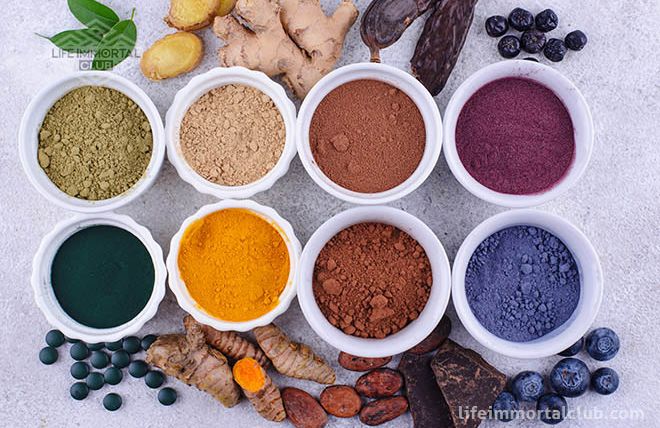Superfoods Unveiled: Unleashing the Potent Elixir of Longevity

Introduction
In the pursuit of a healthy and fulfilling life, nutrition plays a paramount role. And when it comes to optimizing our well-being, superfoods emerge as the shining stars in the culinary universe.
These powerhouses of nourishment offer an abundance of essential nutrients, antioxidants, and bioactive compounds that can significantly impact our longevity and overall health. In this article, we will explore the top ten superfoods that have been scientifically proven to boost vitality from within.
Definition of Superfoods
The term "superfood" has gained significant popularity in recent years, but what exactly does it mean? Unlike a rigid scientific classification, the concept of superfoods refers to natural ingredients that are exceptionally dense in nutrients and possess extraordinary health benefits. These foods are typically packed with antioxidants, vitamins, minerals, and phytochemicals that contribute to their superior nutritional profile.
To be considered a superfood, an ingredient must excel in terms of its antioxidant capacity or possess unique properties that promote overall well-being. Moreover, superfoods are often derived from plant sources; however, certain fish and dairy products can also make the cut due to their exceptional nutrient content.
Importance of Nutrition for Longevity and Overall Health
Nutrition is not merely about satisfying hunger or acquiring energy; it is about nourishing our bodies with essential components required for optimal functioning. A well-balanced diet consisting of nutrient-rich foods is vital for maintaining good health throughout our lives.
Studies consistently show that poor nutrition can lead to various chronic conditions such as heart disease, obesity, diabetes, and even certain types of cancer. Conversely, adopting a nutritious diet can reduce the risk of developing these diseases while promoting longevity.
In addition to reducing disease risk factors, proper nutrition supports healthy aging processes by enhancing cognitive function, reducing inflammation, strengthening the immune system, and protecting against oxidative stress. By incorporating superfoods into our diets, we can harness an array of health benefits that can contribute to a longer and more vibrant life.
Blueberries: The Antioxidant Powerhouse
The Richness of Antioxidants, Particularly Anthocyanins
When it comes to superfoods, blueberries are often hailed as the antioxidant powerhouse. These small, vibrant berries are packed with a wide array of antioxidants, with one group, in particular, standing out: anthocyanins. Anthocyanins give blueberries their deep blue or purple color and have been extensively studied for their health-promoting properties.
These antioxidants have the ability to neutralize harmful free radicals in the body and protect our cells from oxidative stress. Anthocyanins not only provide the visually appealing hue to these berries but also contribute to their potential health benefits.
Research suggests that these powerful compounds may help reduce inflammation, lower cholesterol levels, and improve blood sugar control. By fighting oxidative damage caused by free radicals, anthocyanins support overall cellular health and may play a crucial role in preventing chronic diseases such as cancer and cardiovascular conditions.
Benefits for Brain Health and Cognitive Function
Blueberries don't just deserve attention for their visual allure; they also offer remarkable benefits for brain health and cognitive function. Several studies have shown that regular consumption of blueberries can enhance memory and improve cognitive performance. The antioxidants present in blueberries work by reducing oxidative stress in the brain while improving communication between neurons.
In addition to their antioxidant properties, blueberries contain flavonoids such as quercetin and resveratrol that have been linked to improved memory and learning abilities. These compounds promote healthy brain aging by enhancing neuronal signaling pathways involved in memory formation.
Furthermore, preliminary research suggests that consuming blueberries may even aid in delaying age-related cognitive decline. Blueberries' ability to boost blood flow to the brain due to their high flavonoid content contributes further to maintaining cognitive abilities as we age.
Potential Anti-Aging Properties
Blueberries possess intriguing potential anti-aging properties. The high concentration of antioxidants, especially anthocyanins, aids in neutralizing free radicals and reducing oxidative stress throughout the body. By doing so, blueberries help protect against cell damage and slow down the aging process at a cellular level.
Moreover, blueberries contain other bioactive compounds such as pterostilbene and resveratrol that exhibit anti-aging effects. These compounds have been shown to activate genes involved in longevity pathways and increase lifespan in various organisms.
While further research is needed to fully understand their effects on human longevity, incorporating blueberries into your diet can undoubtedly contribute to a healthy lifestyle that supports graceful aging. Blueberries are not only delicious but also offer an impressive array of health benefits.
From their rich antioxidant content, particularly anthocyanins, to their positive impact on brain health and potential anti-aging properties, these berries are a true superfood for promoting longevity and overall well-being. Including these vibrant berries in your daily diet is an excellent way to nourish your body from within and support optimal health throughout your lifespan.
Salmon: The Omega-3 Source
The Power of Omega-3 Fatty Acids
Salmon, a delectable fish found in both saltwater and freshwater bodies around the world, is acclaimed for its high content of omega-3 fatty acids. Particularly rich in two essential types of omega-3s - eicosapentaenoic acid (EPA) and docosahexaenoic acid (DHA) - salmon offers numerous health benefits that contribute to longevity and overall well-being. These fatty acids are essential for optimal body function, as they cannot be synthesized by the human body and must be obtained through dietary sources.
Promoting Heart Health and Reducing Inflammation
One of the greatest advantages of consuming salmon is its remarkable ability to promote heart health. The omega-3 fatty acids found in this fish help lower triglyceride levels, reduce blood pressure, and prevent the formation of blood clots within arteries. By doing so, salmon aids in reducing the risk of heart disease, a leading cause of mortality worldwide.
Moreover, these fatty acids possess potent anti-inflammatory properties that inhibit the production of inflammatory molecules within the body. By mitigating chronic inflammation, salmon contributes to the prevention or management of various conditions like arthritis, metabolic syndrome, and even certain types of cancer.
Supporting Brain Function and Reducing Neurodegenerative Risks
In addition to benefiting cardiovascular health, regularly incorporating salmon into your diet can have profound effects on brain function. EPA and DHA play crucial roles in maintaining healthy brain structure and facilitating efficient communication between brain cells.
Research suggests that a diet rich in these omega-3s may improve cognitive performance, enhance memory retention abilities, and even reduce symptoms associated with mood disorders such as depression or anxiety. Furthermore, emerging studies demonstrate a potential link between omega-3 consumption and a lower risk of neurodegenerative diseases like Alzheimer's and Parkinson's.
While more research is needed, including salmon in your diet could be a proactive measure to support long-term brain health. By relishing the succulent delights of salmon, you not only indulge your taste buds but also nourish your body with essential omega-3 fatty acids that offer an array of health benefits.
From promoting heart health and reducing inflammation to supporting optimal brain function and potentially lowering the risk of neurodegenerative diseases, this superfood proves its worth in enhancing longevity and overall well-being. So, why not make salmon a staple in your diet as a delightful and nutritious addition?
Kale: The Nutrient-Dense Leafy Green
The Powerhouse of Vitamins and Minerals
Kale, scientifically known as Brassica oleracea, belongs to the cruciferous vegetable family and is hailed as one of the most nutrient-dense leafy greens available. It is a treasure trove of essential vitamins and minerals that are vital for maintaining optimal health. In particular, kale boasts significant amounts of vitamins A, C, and K. Vitamin A plays a crucial role in promoting healthy vision and supporting the immune system.
Vitamin C acts as a potent antioxidant, protecting our cells from damage caused by harmful free radicals while also boosting collagen production for vibrant skin. Vitamin K is instrumental in blood clotting and maintaining bone health.
Antioxidant-Rich Goodness
One of the standout features of kale lies in its wide array of antioxidants. Among these are lutein and zeaxanthin—carotenoids recognized for their protective effects on eye health.
These compounds accumulate in the retina where they act as a natural shield against harmful blue light rays and oxidative stress linked to age-related macular degeneration (AMD) and cataracts. By regularly incorporating kale into your diet, you can give your eyes an extra layer of defense against potential vision impairments that often accompany aging.
A Multifunctional Superfood
Beyond its impressive vitamin and antioxidant content, kale offers an array of additional benefits that contribute to overall well-being. The abundant calcium present in kale supports bone strength and density—essential factors in preventing osteoporosis later in life.
Additionally, iron found within this leafy green aids red blood cell production while ensuring efficient oxygen transportation throughout the body. Moreover, kale's high fiber content supports digestive health by promoting regularity while also providing sustenance for beneficial gut bacteria.
Kale stands out as an extraordinary superfood due to its exceptional nutrient profile. Its vitamins A, C, and K provide numerous health benefits ranging from immune system support to skin and bone health.
The presence of lutein and zeaxanthin showcases kale's potential in safeguarding eye health by combating age-related vision decline. By incorporating this versatile leafy green into your diet regularly, you can harness its powerful properties to promote longevity and enhance overall well-being.
Turmeric: The Golden Spice with Anti-inflammatory Benefits
Rich in curcumin, a potent anti-inflammatory compound, Turmeric, a vibrant yellow spice commonly found in Indian cuisine, has gained popularity in recent years for its remarkable health benefits. This ancient spice contains an active compound called curcumin, which is known for its potent anti-inflammatory properties.
Curcumin inhibits the activity of inflammatory enzymes and blocks pathways that contribute to inflammation in the body. By reducing chronic inflammation, turmeric can help improve overall health and protect against various diseases.
Tumeric May help reduce the risk of chronic diseases like heart disease
Chronic inflammation is considered a driving force behind many chronic diseases, including heart disease, diabetes, and cancer. Turmeric's powerful anti-inflammatory effects make it an excellent natural remedy for reducing the risk of these conditions.
Studies have shown that curcumin can help lower cholesterol levels and triglycerides while improving markers of heart health such as blood pressure and endothelial function. Additionally, curcumin's antioxidant properties may protect against oxidative damage to blood vessels and promote optimal cardiovascular function.
Potential benefits for brain health and prevention of age-related cognitive decline
In addition to its anti-inflammatory properties, turmeric also shows promising effects on brain health. Curcumin has been found to cross the blood-brain barrier and exhibit neuroprotective effects by reducing oxidative stress and inflammation in the brain.
It may help enhance memory and cognition by promoting the production of Brain-Derived Neurotrophic Factor (BDNF), a protein involved in nerve cell growth and maintenance. Furthermore, studies suggest that regular consumption of turmeric could potentially reduce the risk of age-related cognitive decline and neurodegenerative disorders like Alzheimer's disease.
Conclusion
Turmeric truly deserves its title as a superfood, thanks to its abundant curcumin content and remarkable health benefits. Its potent anti-inflammatory properties make it a valuable ally in reducing the risk of chronic diseases, especially heart disease. Furthermore, turmeric's potential impact on brain health and cognitive function brings hope for those seeking ways to support optimal brain aging.
By incorporating this golden spice into our diets, whether as a flavorful addition to meals or in the form of supplements, we can harness its natural healing powers and take proactive steps towards a healthier and more vibrant future. Embracing the power of turmeric is an empowering choice that opens doors to improved well-being and longevity.







